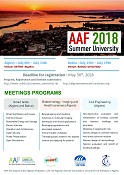You are here
Biology, biotechnology and health.
Biotechnology, Biomedical Engineering, Bioimaging, and Health Sciences Program : Emphasis on cancer.
1-Program Coordinators:
- Hind Bouk’hil, FR (co-chair)
- Hacene Boukari, USA (co-Chair)
- Derradji Boumrah, UK
- Yassine Amrani, UK
- Taha Merghoub, USA
- Zoubir Ouhib, USA
- Chafia Touil-Boukoffa (DZ)
- Mehdi Bourouba (DZ) Lecturer from Algeria, DZ
- Ahmed Zergoune (DZ) Lecturer from Algeria, DZ
- Wassil Kacha, UK
2- Program Description:
Cancer treatment has evolved drastically in the last few years and has moved from one size fits all approach to modern personalized medicine. As a result, multidisciplinary approaches to treatment have emerged and recognized as optimal for cancer care and for improving outcomes. Biotechnology, Biomedical engineering and Health science are key to these advances.
- Biotechnology is the applied science of using living organisms and their by-products for commercial development. Everyday items, such as milk, antibiotics, and bio-fuels are commodities of biotechnology. Biotechnologies have contributed considerably in drug delivery and in the development in new cancer targeting agents which has led to the recent emergence of the new field of immune-oncology.
- Biomedical Engineering applies principles and design concepts to medicine and biology for healthcare purposes. Biomedical engineering advanced technologies for a broad range of cancer applications, especially early cancer detection, minimally invasive surgery, and targeted therapies.
- Bioimaging is a highly multidisciplinary and interdisciplinary applied field that is used to investigate biological systems over a broad scale, from single molecule, to cells, to tissues, to biological organisms. Typically, it covers the complex protocol of preparing the samples, acquiring multidimensional images, applying mathematical and computational tools to process the images, visualizing the structural and/or functional properties of the living objects or systems, and extracting and analyzing relevant information.
- Health Sciences apply a variety of disciplines which relate to the application of science to health. They led the integration of multiple fields in medicine as evidenced by the integration of medical imaging and radiation therapy which became very efficient tools in fighting modern diseases (cancer, cardiovascular and brain diseases).
This program is built to complement and support present/future developments in Algeria with an emphasis on the practical and research aspects. It is also essential to learn and develop new techniques and methodologies as they arise in the fields of Biotechnology, Biomedical Engineering, Bioimaging, and Health Sciences. The ultimate goal is to share, implement, adopt and adapt the new developments in personalized medicine for cancer treatment.
3- Covered topics:
This program is broad and will cover basic concepts, advanced techniques and most recent scientific and technological achievements in the field. It will focus on preclinical drug discovery, transgenic animal research, inflammatory diseases, analytical chemistry as well as procedure for IND submission and regulatory affairs. It will also focus on healthcare practice, clinical research and most active research and advances in areas such as genomics and state of the art imaging.
The main topics of the program will include:
• In-vitro Culture (Biotech and Agriculture) and cell culture (Bioetch and Health).
• Good laboratory practices and analytical chemistry (RMN 2D, MS, IR, UV, HPLC, LC-MS, and others)
• The use of living organisms and bioprocesses in engineering, technology and medicine.
• Advances in molecular Imaging techniques and clinical applications
• Radiation therapy and related imaging: theory, applications and associated research
• Anatomical/functional imaging (X-ray, mammography, CT, MRI, nuclear medicine and PET)
• Examples of bioimaging modalities include confocal microscopy, SEM, X-ray imaging, CT, MRI and fMRI, PET.
• Imaging fusion and quality control in medical imaging
• Radiation safety, related regulations and good practices
• Translating basic research into applied science and applying for patents
4- Desired Learning Outcomes:
Participants will be exposed to the latest technologies, and learn theoretical and practical knowledge on diverse relevant aspects of biology, radiotherapy, bioimaging, medical imaging modalities, radiation safety and
related national and international legislations. Instructors will guide and assist participants, working in academia, research centres and hospitals to develop their skills, and will build a network of multiple actors in various fields in Algeria and abroad in order to build future collaborative projects.
5- Who Should Attend the Course?
Biologists, radiation oncologists, researchers, radiotherapists, radiologists, medical physicists, microscopists, image scientists, biomedical engineers. Graduate students as well as post-doctoral researchers are welcomed.
Submission:
Applicants must send the registration form with a short CV via the submission link:
https://easychair.org/conferences/?conf=aaf2018sum
AAF2018SUM-Instructions for Authors.pdf ![]()
- Be sure to choose only one course topic among :
Topic 1: Smart Grids in USTHB ;
Topic 2: Biology, biotechnology and health ;
Topic 3: Civil engineering and architecture ;
Topic 4: Smart Grids in Batna .
- Limited places - Candidates will be selected based on their curriculum.
SU2018_G2_TentativeTimetable.pdf ![]()
By F.Djebarra

